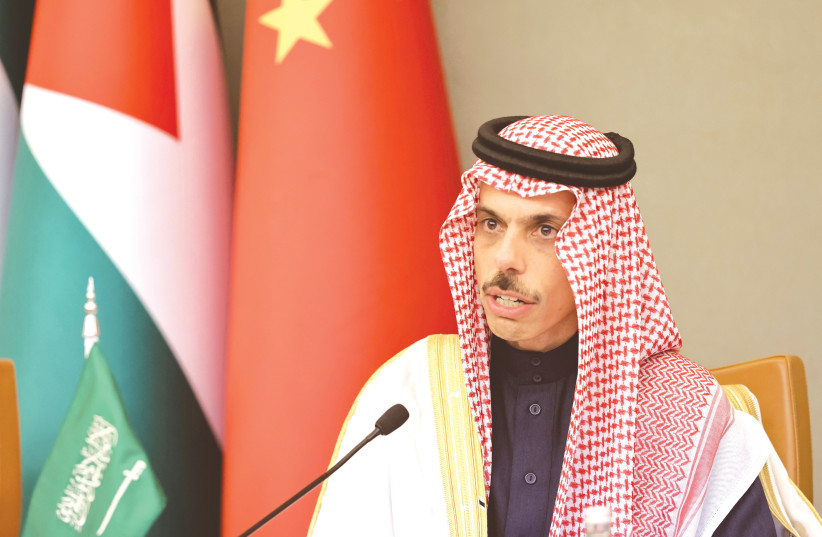Saudi Foreign Minister Prince Faisal bin Farhan said there will be no normalization with Israel until the Palestinians achieve statehood.
That’s not true for a lot of good reasons. Normalization between the kingdom and Israel has actually been underway for some time even though Palestinian statehood remains further away than ever. The Saudis have grown weary of Palestinian intransigence and have decided it is in their own interest to build relations with the Jewish state. Also, the two countries share a common cause: stopping Iran’s terrorism and nuclear ambitions.
The Arabs states have vetoed the Palestinian veto, which said no recognition or peace with Israel until Palestinian claims, including statehood, were achieved. Several moderate Sunni states have opted for normalizing relations with Israel and the trade, technology and tourism that would bring them, but most of all for the critical shared strategic interest.
The Palestinians’ maximalist demands and unwillingness to make meaningful compromises have frustrated their moderate Arab benefactors who decided that opening to Israel will help stabilize and protect their region. They still pay lip service to the Palestinian cause, talk about statehood and send money. These countries – the United Arab Emirates, Bahrain, Morocco and Sudan – were never at war with Israel, as Jordan and Egypt were, and grew to resent Palestinian intransigence.
Prospects for Israeli-Palestinian peace are slim and there are none in the foreseeable future for several reasons. The Israelis don’t want it. The Palestinians aren’t ready. The moderate Arabs have other priorities. The Americans can’t go it alone, even if President Joe Biden wanted to, which he doesn’t.

The new extremist government in Jerusalem not only opposes the two-state solution but it is working hard to make sure future Israeli governments can’t make it happen.
The Palestinians have a sclerotic, inept and corrupt government under an 87-year-old president, now in the 18th year of a four-year term, who continues to refuse to groom a successor or hold new elections. Like Benjamin Netanyahu, Mahmoud Abbas is unwilling, unable and uninterested in making peace.
President Biden is a longtime supporter of the two-state solution, but he has no delusions about restarting peace talks. There is nothing he can do until there are new leaders on both sides who are ready to make difficult, politically explosive compromises. Meanwhile, he has too many other more important and more urgent matters on his plate.
The president’s priorities will be “no change in the status quo on the Temple Mount, no annexation, no new settlements and no legalization of outposts,” according to David Makovsky of the Washington Institute for Near East Policy. In other words, he wants stability, not provocations or surprises.
It is questionable whether Netanyahu is willing or able to deliver on even those limited goals.
If the prime minister goes through with the overhaul of the judicial system that he and his partners are demanding, it will bring international condemnation and make it more difficult for the US to defend Israel in the international arena.
Look for the administration to wall off the domestic political turmoil from the strategic relationship, which will continue with business as usual. Right now, it is unclear whether Biden would use the defense relationship as pressure against annexation and anti-democracy measures.
THE PRO-WESTERN Arab leaders will continue to pay lip service to Palestinian statehood, but in reality, they keep moving closer to Israel in strategic as well as economic terms – although the new extremist government in Jerusalem threatens to bring that process to a crashing end.
Iran deserves credit as the matchmaker, not just for Israel and the Gulf states for also bringing Israel and the West Bank Palestinians closer together in a symbiotic relationship. They may consider each other the enemy, but the working security relationship between them has made life safer for both. Israel is helping keep the Iranian-backed Hamas from taking control of the West Bank from the secular Fatah PLO. In turn, the Palestinian Authority generally cooperates with Israel against terror attacks.
But that arrangement could come crashing down if the ultra-nationalists and ultra-religious leaders in the Netanyahu government follow through with plans to make sure Palestinians will never have a state of their own.
The coalition’s guidelines document leaves no doubt about its intention. It declares: “The Jewish people have an exclusive and inalienable right to all parts of the Land of Israel.”
National Security Minister Itamar Ben-Gvir and Finance Minister Bezalel Smotrich, leaders of the extremist Otzma Yehudit/Religious Zionist bloc, want to dismantle the Palestinian Authority, legalize and expand settlements, encourage Palestinians to emigrate, and annex the West Bank. Palestinians in the territories would be denied citizenship rights afforded to Jews, effectively creating apartheid.
It is hard to imagine Israel’s Abraham Accords partners, as well as Egypt and Jordan, and the international community, ignoring such moves. It also threatens to create deep fissures in relations with Washington and the American Jewish community.
Netanyahu was forced to back off annexation three years ago as the price of the agreement with the UAE and the Abraham Accords. He wasn’t beholden to the partners he has today, and if he tries to block their goals this time, they have the power to bring down his government.
From the other direction, he faces growing public outrage over his intent to neuter the Supreme Court and overhaul the nation’s judicial system – which includes provisions to drop criminal charges against him for which he is currently on trial. Tens of thousands of Israelis have been taking to the streets in cities around the country for the past several weeks to protest what they consider a right-wing assault on democracy and the independent judiciary, and the numbers have been growing each week.
The greatest danger facing Israel today is not from its neighbors, not from Iran and its proxies, but from homegrown threats to the survival of its democracy.
The writer is a Washington-based journalist, consultant, lobbyist and former American Israel Public Affairs Committee legislative director.
